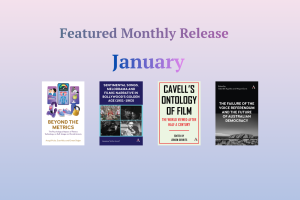Featured releases: September 2025
September marks the gentle shift from summer’s warmth to autumn’s calm, a month of balance and reflection. We are celebrating this month with an exciting line-up of new releases. From Louis XIV’s conquests, human ethics, to Byron’s romantic poetic voice, we cover a range of subjects this month. Here’s a sneak peak into some of the titles.
How Louis XIV Survived His Hegemonic Bid
This book examines why Louis XIV of France succeeded where other modern aspiring hegemons failed, leaving his country larger and intact. It argues that his unique war-ending strategy – making major concessions from a position of strength – allowed him to exit general wars without provoking uncompromising coalitions, securing limited but lasting gains. The study traces Louis’s foreign policy background, analyses his three major wars, compares his approach with other failed hegemons and explores implications for international relations theory and contemporary policymakers facing challenges with powers like China and Russia.
Ethics, Law and the Business of Being Human: Against Nine to Five Philosophy
This book bridges the gap between philosophy and law, arguing that both disciplines, though often isolated in academia, are vital to how humans live and govern themselves. Critiquing the academy’s insularity, it presents a series of essays tackling foundational questions – ranging from metaphysics, identity, freedom and human value to ethics in medicine, technology, environment, law and politics. Through topics such as disability, sexual and reproductive ethics, pandemic response and even Brexit, the essays confront the central questions of existence: What kind of creatures are we, and how should we live?
The European Byron: Mobility, Cosmopolitanism and Chameleon Poetry
This book examines Byron’s literary borrowings and transformations – what he called ‘mobility’ – and how they shaped both his poetic voice and his European impact. Drawing on influences from Thomas Moore, Tasso, Shelley, Dante and Madame de Staël, among others, Byron constructed multiple identities: Irish, Italian, Scottish and cosmopolitan. The study traces how Byron’s reading became writing, from Don Juan and Childe Harold to Manfred, and how his style and political stance inspired major European writers like Pushkin and Mickiewicz. By exploring Byron’s manuscripts, marginalia and conversations with contemporaries, the book shows how Byron’s ironic, digressive and improvisational mode helped transform the epic into a modern, mobile, European form – one that fused poetry, politics and freedom.
Neo-Victorian Lesbians on Screen
Neo-Victorian Lesbians on Screen explores how film and transmedia adaptations reimagine nineteenth-century lesbian lives, challenging historical silences and reshaping audience perceptions. Drawing on neo-Victorian theory, the book shows how these portrayals engage in acts of reinterpretation and cultural memory, blending past and present. By analysing the gaze, intertextuality and audience awareness, it highlights how screen representations complicate lesbian visibility, disrupt historical distance and reposition the lesbian as both a Victorian and modern figure whose presence filmmakers alternately embrace or resist.
To view other titles, visit: www.anthempress.com
For proposal submissions or enquiries, contact: proposal@anthempress.com
Latest Posts

Voice, Democracy and the Future of Reform
This is a guest post by Gabrielle Appleby and Megan Davis, authors of The Failure of the Voice Referendum and the Future of Australian Democracy Don’t be fooled by...

Talk of the Town: Monthly Publishing Industry News Digest
Global publishing and research continue to shift under the pressures of technological change, policy reform and international collaboration. From market insights at major book fairs to debates around open access,...

Featured Monthly Releases – January 2026
January opens the year with a sense of renewal and momentum, setting the tone for the months ahead. Discover our featured releases for this month. The Failure of the Voice...

When the Mirror Lies: A Female Bodybuilder’s Battle with Fitness Tech and Body Dysmorphia
This is a guest post by Asegul Hulus, author of Beyond the Metrics: The Psychological Impact of Fitness Technology on Self-Image and Social Anxiety Six months have passed since I...

